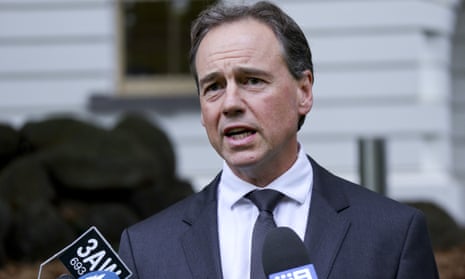Pressure from the health department prompted the parliamentary library to remove then amend advice issued in June that contradicted the health minister Greg Hunt’s assurances about police access to My Health Records, new correspondence reveals.
Emails produced under freedom of information reveal that the chief operating officer of the department, Matt Yannopoulos, complained that the advice by the library’s director of foreign affairs, defence and security, Nigel Brew, was “misleading and/or inaccurate”.
The emails show that the health department was concerned about media reports summarising the advice contributing to a backlash against the My Health Record and the library at first resisted the complaint before caving to pressure by removing controversial elements.
In an email dated 25 June, the day of Guardian Australia’s report on the library’s advice, Yannopoulos disputed the conclusion that the My Health Record law:
“represents a significant reduction in the legal threshold for the release of private medical information to law enforcement”
does not mandate the Australian Digital Health Agency only release records with a warrant, despite that being their policy; and
“seems at odds” with Hunt’s public statements that records can only be accessed with a court order.
Jonathan Curtis, the assistant secretary of the library’s research branch, defended the advice by responding that the library had concluded after a review that it was “accurate and justifiable”.
“Our point … [is] simply that there is a difference between law and policy as the agency is not required or obligated to take a court order as its standard,” Curtis said.
Although the ADHA had said it had not released any records to law enforcement in the last six years, Curtis noted it also states it has “not received any requests”.
Yannopoulos replied at almost 10pm to complain that “the media are quoting your article as a definitive and comprehensive statement of the law”.
Yannopoulos argued the article failed to explain how the ADHA was applying the law, and noted that the Privacy Act also allows GPs to disclose health information where they “reasonably believe” that it is “reasonably necessary”, a comparable provision to the My Health Record law.
He warned the library had left parliamentarians with an “incomplete view of the law and how it is being applied … adding to confusion in the public debate”.
On the morning of 26 June, Curtis agreed to take the article down pending consideration of those details from the department.
At that time a spokesman for the library told Guardian Australia the parliamentary librarian, Dianne Heriot, had “decided to temporarily take down the post” while it was reviewed after concerns were raised by the health department.
The advice was republished that evening removing the most controversial elements including that the My Health Record significantly reduces the threshold for release of information and the conclusion that law enforcement agencies will not require a warrant.
The original advice was backed by the Queensland Police Union, which told its members that no warrant would be required. Both reports contributed to a mounting backlash against the My Health Record, with the Australian Medical Association vowing to do “whatever it takes” to fix ambiguities around privacy.
By the time the advice was removed, the then-prime minister, Malcolm Turnbull, had promised that concerns raised by the AMA and the Royal Australia College of General Practitioners would be addressed.
On 31 July Hunt was forced to back down, announcing changes to legislation so no record can be released to police or government agencies without a court order.
The parliamentary library has guaranteed funding under a resources agreement, which requires it to provide high-quality analysis while “having regard to the independence of parliament from the executive government of the commonwealth”.
